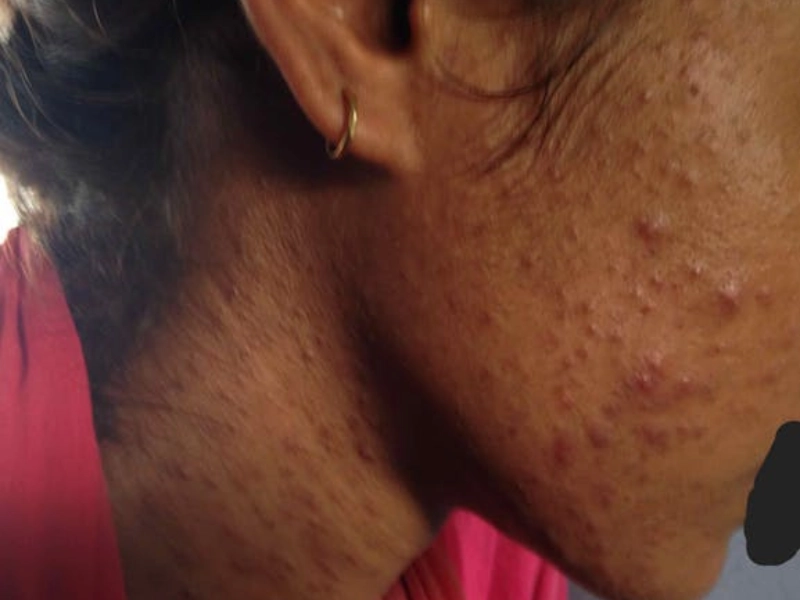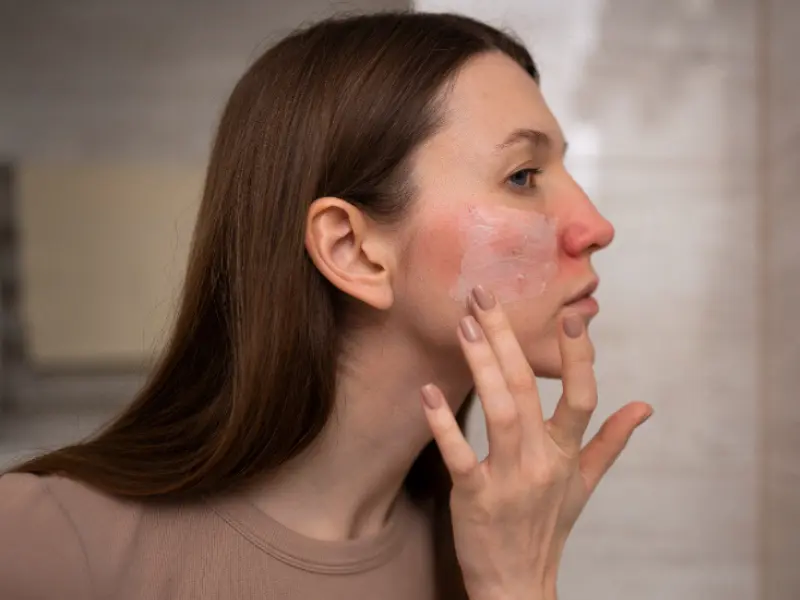Can Your Diet Trigger Acne?
Published: 23 Mar 2025
Ever wonder if that slice of pizza or bowl of ice cream is secretly behind your breakouts? You’re not alone! There’s so much conflicting advice out there—some say diet has nothing to do with acne, while others swear cutting sugar cleared their skin. So, what’s the truth?
This article clears up the confusion by breaking down how food and acne are connected, what science says, and how you can adjust your diet for healthier skin.
How Diet Might Affect Acne
Diet can play a hidden role in acne by influencing your body’s oil production, inflammation, and even the health of your gut.
1. How Certain Foods May Increase Inflammation or Oil Production
- Some foods, especially those high in sugar or unhealthy fats, can trigger inflammation in your body. Think of inflammation like tiny “fires” inside you that can make acne worse.
- On top of that, certain foods may tell your skin to produce more sebum (oil), and when too much oil mixes with dead skin and bacteria, you get clogged pores… and hello, pimples! (1)

2. The Role of Hormones Like Insulin and IGF-1
When you eat a lot of sugary or processed foods, your blood sugar rises fast. This makes your body release insulin, a hormone that helps control blood sugar.
But here’s the thing—high insulin can also increase another hormone called IGF-1 (Insulin-like Growth Factor 1).
And what does IGF-1 do? It tells your skin to make more oil and grow more skin cells, which can clog pores and cause breakouts. (2)
👉 Tip: Eating foods that keep your blood sugar stable, like whole grains and veggies, may help reduce this hormonal rollercoaster.

3. Gut Health and Skin Connection
- Your gut (digestive system) and skin are like long-distance best friends. When your gut is out of balance (too much bad bacteria or inflammation), it can show up on your face as acne.
- A healthy gut helps keep inflammation low, supports your immune system, and may even calm down those angry breakouts. (3, 4)
👉 Pro tip: Adding probiotic-rich foods (like yogurt or kefir) to your diet might help your gut, and your skin, feel happier.
4.1 Sugary foods and drinks:
Sodas, candy, and pastries flood your body with sugar, forcing insulin to rise fast. High insulin pushes oil glands into overdrive, clogging pores and sparking acne.

4.2 Dairy products:
Milk, cheese, and ice cream may increase certain hormones, like IGF-1, which are linked to more oil production and inflammation—two things acne loves.

4.3 High-glycemic-index foods:
White bread, chips, and pasta break down quickly into sugar. This causes blood sugar spikes, which may worsen acne by increasing inflammation and oil output.

4.4 Fast food and greasy meals:
Burgers, fries, and pizza are packed with unhealthy fats and processed ingredients. They can inflame the body and weaken skin health, making acne more likely.

💡 Tip: Swap white bread for whole grains—they’re packed with fiber and help steady your blood sugar.
5. Does Everyone React the Same to Food?
The answer is “No”.
- Not all bodies are the same. Your genes and body chemistry affect how your skin reacts to certain foods.
- While dairy or sugary treats may cause breakouts for some, others might eat them with no skin issues at all.
- It’s key to notice patterns. If a food seems to cause flare-ups, it might be your personal trigger, keeping a food journal can help!
| 6. Foods That May Help Clear Your Skin |
|---|
6.1 Omega-3-rich foods:Salmon, walnuts, and chia seeds are packed with omega-3 fats. These healthy fats calm inflammation, which can reduce redness and swelling linked to acne. 6.2 Fruits and vegetables:Colourful options like berries, spinach, and carrots are loaded with antioxidants and vitamins. They help your skin heal faster and protect it from damage. 6.3 Probiotic-rich foods:Yogurt, kefir, and fermented foods like kimchi boost your gut bacteria. A healthy gut can improve digestion and lower skin inflammation—giving you clearer skin. 6.4 Water intake:Drinking enough water keeps your skin hydrated and flushes out toxins. Well-hydrated skin looks smoother and feels healthier. 💡 Tip: Aim for at least 8 glasses of water daily—it’s one of the simplest ways to support clear skin! |
7. Practical Tips to Prevent Diet-Related Acne
7.1 Keep a food and skin journal:
Write down what you eat and how your skin reacts. Over time, patterns will start to show!
7.2 Slowly cut back on trigger foods:
Don’t quit everything at once. Gradually reduce sugary, greasy, or high-dairy foods and see how your skin responds.
7.3 Focus on balanced, whole-food meals:
Fill your plate with fresh fruits, veggies, whole grains, lean proteins, and healthy fats. Your skin will thank you!
7.4 Don’t stress too much—diet is just one piece of the puzzle:
Remember, acne has many causes like hormones, stress, and skincare habits. The diet helps, but it’s not the whole story!
8. Conclusion
So guys, in this article, we’ve covered Can Your Diet Trigger Acne? in detail. We looked at common food triggers and how simple swaps might help reduce breakouts. Personally, I recommend focusing on whole foods and cutting down on high-sugar and greasy meals—you might be surprised by the results!
Ready to take the next step toward healthier skin? Dive into more of our easy-to-follow guides and take control of your skin journey today!
9- FAQs
Not always. While diet can influence acne, it’s usually one of several factors like hormones, stress, and skincare habits. So, food plays a role, but it’s not the only cause.
It depends on your body. Some people notice changes in a few weeks, while others may take a few months. Consistency is key—stick with healthy eating to see results
Not for everyone. Some people can eat dairy without any skin problems, while others notice breakouts after consuming milk or cheese. It’s important to track your skin’s reaction.
Yes, sugary foods can spike insulin and boost oil production, which might clog pores. That can lead to breakouts in some people. Try cutting back on soda, candy, and pastries to see if your skin improves.
Water helps! Staying hydrated supports skin health and may reduce dryness or irritation. But water alone won’t “cure” acne—it works best as part of a healthy lifestyle.
Greasy foods can trigger inflammation and worsen acne for some people. They also tend to lack the nutrients that your skin needs. Enjoy them occasionally, but try to balance them with whole, fresh foods.
Foods rich in omega-3s, like salmon and walnuts, can help reduce inflammation. Fruits, veggies, and probiotic-rich foods are also great for your skin. They support healing and keep your gut happy.
Yes, for some people! Probiotics help balance your gut, and a healthy gut can lead to clearer skin. Try yogurt, kefir, or fermented foods to add good bacteria to your diet.
No, you don’t have to cut carbs fully. Just be mindful of high-glycemic carbs like white bread or sugary cereals that spike blood sugar. Whole grains and fiber-rich carbs are better choices.
Definitely! Stress can mess with your hormones and cause breakouts, even if you’re eating well. That’s why managing stress is just as important as a healthy diet.
At MedicaWire, all medically sensitive content is reviewed by licensed healthcare professionals. Our team ensures that the information you read is accurate, up-to-date, and based on trusted medical sources.
Learn how we maintain high standards by reading our Editorial Policy.
📚 Sources
- Spencer EH, et al. (2009). Dairy consumption and acne: a case-control study.
https://pubmed.ncbi.nlm.nih.gov/31303778/ - Burris J, et al. (2017). Relationships of self-reported dietary factors and perceived acne severity in a cohort of New York young adults.
https://pubmed.ncbi.nlm.nih.gov/24412232/ - Smith RN, et al. (2007). A low-glycemic-load diet improves symptoms in acne vulgaris patients: a randomized controlled trial.
https://pubmed.ncbi.nlm.nih.gov/17616769/ - Bowe WP, et al. (2010). Acne vulgaris, probiotics and the gut-brain-skin axis—back to the future?
https://pmc.ncbi.nlm.nih.gov/articles/PMC3038963/ - Melnik BC. (2012). Diet in acne: further evidence for the role of nutrient signalling in acne pathogenesis.
https://pubmed.ncbi.nlm.nih.gov/22419445/ - Danby FW. (2009). Nutrition and acne.
https://pubmed.ncbi.nlm.nih.gov/21034984/ - Kim J, et al. (2021). Impact of omega-3 fatty acids on acne vulgaris: a review of clinical evidence.
- https://pubmed.ncbi.nlm.nih.gov/35798259/
ℹ️ Our Promise
MedicaWire follows strict sourcing guidelines and only references peer-reviewed studies, academic institutions, and reputable medical associations. We update content regularly to reflect new health information.

- Be Respectful
- Stay Relevant
- Stay Positive
- True Feedback
- Encourage Discussion
- Avoid Spamming
- No Fake News
- Don't Copy-Paste
- No Personal Attacks



- Be Respectful
- Stay Relevant
- Stay Positive
- True Feedback
- Encourage Discussion
- Avoid Spamming
- No Fake News
- Don't Copy-Paste
- No Personal Attacks




